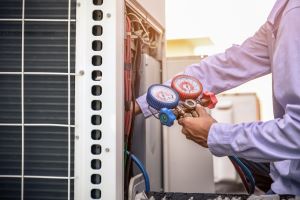Schedule Your System Inspection Today with DMAKS HVAC Experts.
Schedule Your System Inspection Today with DMAKS HVAC Experts.
Blog Article
Just How to Pick the Right Cooling And Heating System for Your Needs
Picking the suitable heating and cooling system is a crucial choice that requires cautious consideration of various factors. Begin by assessing your home's dimension, layout, and special requirements, as these elements dictate the needed ability and configuration of the system. Furthermore, developing a spending plan that encompasses installment and long-lasting functional costs is essential. As you consider your alternatives, understanding power efficiency rankings and the ramifications of your neighborhood environment will play a substantial role in your selection. However, the myriad of system kinds offered can complicate this process, leading one to question which path ultimately brings about optimum convenience and effectiveness.
Examine Your Home Dimension
Analyzing your home dimension is a crucial primary step in choosing the ideal cooling and heating system. The dimension of your home straight influences the home heating and air conditioning capability required for effective climate control. An a/c system that is also little will certainly battle to keep comfy temperatures, resulting in increased energy intake and use on the unit. Conversely, an extra-large system can cause short cycling, poor humidity control, and inefficient operation.
To properly examine your home dimension, gauge the square footage of each room, taking into consideration aspects such as ceiling height and the format. In addition, consider the insulation quality and the number of home windows, as these aspects impact thermal efficiency. Houses with open flooring plans may require different system arrangements compared to those with many divided rooms.
Using the Handbook J load computation approach can provide a more specific quote of your heating and cooling needs. This approach represent different elements, consisting of neighborhood environment, solar gain, and tenancy patterns. By thoroughly assessing these facets, you can ensure that your chosen HVAC system is appropriately sized, resulting in improved convenience, energy performance, and durability of the equipment.
Determine Your Spending Plan
Establishing your spending plan is a pivotal action in the HVAC system option process, as it establishes the parameters for your alternatives - DMAKS HVAC. An a/c system is a considerable financial investment, and understanding your monetary restrictions will certainly aid limit choices that fit within your methods
Begin by analyzing not only the first purchase cost but likewise installment prices, which can vary significantly relying on the intricacy of the project. In addition, think about continuous expenses such as upkeep, repair services, and power consumption. A system might show up cost effective originally but can lead to higher expenses gradually if it is much less efficient.
It is a good idea to allot a backup fund for unanticipated costs that may emerge during installation or first system changes (DMAKS HVAC). Furthermore, discover financing options or refunds that might be available, as these can alleviate the problem of ahead of time expenses
Eventually, having a clear spending plan permits you to involve with HVAC professionals better, guaranteeing you receive tailored suggestions that straightens with your economic goals and home needs. By being thorough regarding your budget, you can make educated decisions that improve comfort without endangering economic security.
Evaluate Energy Performance
Energy effectiveness plays a crucial duty in the overall performance and cost-effectiveness of your a/c system. When selecting a system, it is vital to consider its energy performance rankings, as these figures directly affect your utility costs and environmental footprint. Try to find systems with a high Seasonal Energy Full Report Performance Proportion (SEER) for cooling down and a high Annual Gas Usage Performance (AFUE) score for heating. Higher ratings show greater efficiency, suggesting more comfort for much less energy usage.
Furthermore, consider the Power Celebrity certification, which signifies that the system fulfills rigorous performance guidelines set by the Epa. Purchasing an Energy Star-rated cooling and heating system can result in considerable cost savings in time, especially in locations with extreme temperature changes.
An additional variable to evaluate is the system's dimension and ability. An extra-large or undersized device can cause ineffectiveness and increased energy costs. DMAKS HVAC. Correct sizing, typically identified with a Manual J tons computation, makes certain that the system runs at optimal effectiveness


Take Into Consideration Climate and Setting
When selecting an more information a/c system, it is crucial to think about the regional climate and environmental problems, as these aspects significantly influence the system's performance and effectiveness. Various regions experience varying temperature level extremes, humidity degrees, and seasonal modifications, every one of which impact home heating and cooling down needs.

Moreover, local ecological variables, such as air quality and prospective allergens, should educate your selection. Systems outfitted with advanced purification modern technologies can assist alleviate toxins and give cleaner air. Additionally, take into consideration the power resources offered in your location-- some HVAC systems are much more efficient when powered by gas or eco-friendly power sources.
Eventually, straightening your a/c system choice with your local climate and environmental factors to consider will certainly cause improved convenience, boosted efficiency, and lower energy costs.
Explore System Kind and Features
As home owners seek to optimize convenience and effectiveness, exploring the various sorts of a/c systems and their unique functions ends up being necessary. The main kinds of a/c systems consist of air conditioning, heatpump, ductless mini-split systems, and heating systems. Each system offers distinctive advantages customized to various needs and preferences.
Central air systems supply uniform cooling throughout a home, making them optimal for larger important link rooms. Warm pumps function as both home heating and cooling remedies, using electricity to move heat, which can cause lower energy prices. Ductless mini-split systems are becoming increasingly preferred due to their versatility and convenience of installment, permitting house owners to control the temperature level in specific rooms without considerable ductwork.

Conclusion
In verdict, picking the proper heating and cooling system necessitates mindful consideration of numerous factors, including home size, budget plan constraints, energy effectiveness, neighborhood climate, and available system types. A comprehensive evaluation of these components makes certain optimal convenience and cost-effectiveness. By following a structured technique, home owners can make enlightened decisions that straighten with their certain needs and preferences, eventually causing boosted interior air quality and power cost savings.
Report this page